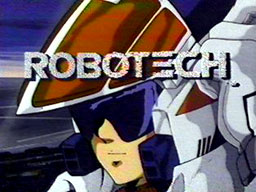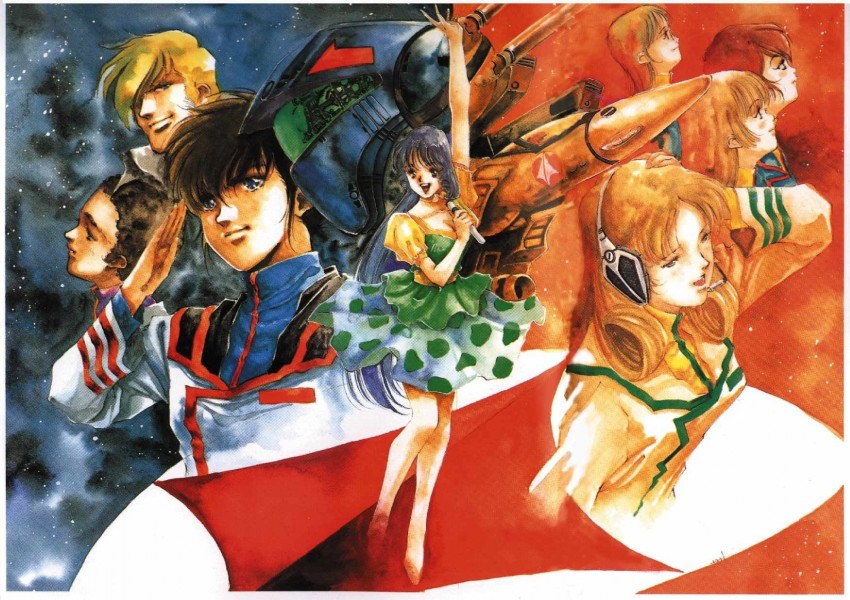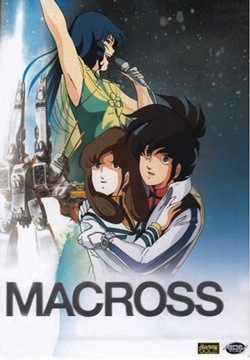
I had never known Robotech was actually a Japanese animated program until perhaps late middle-school or early high school. I had watched shows like Tranzor Z, Star Blazers, and Voltron with my Dad (who had been in his very early 20s) before I was of school-age, and had developed an affinity for the animation style (probably because I associated it with quality time spent with my father). Thus, when I finally encountered Robotech, the combination of animation style with dynamic, sympathetic characters and an evolving story forever endeared me to Japanese animation long before I even knew what it was. I would go on to discover novelizations and comic prints of the franchise, but I never truly recaptured that feeling of love for a story that I had felt as a kid. That changed once I had reached college and started collecting アニメ (anime) as a young adult.
It was in late high school that I discovered that the Robotech series was actually three distinct Japanese anime, licensed to Harmony Gold and produced by Carl Macek as a single storyline. The dialogue had been edited in order to tie the three stories together and to soften some of the more mature themes for an audience that would undoubtedly be primarily comprised of young children (as I had been at the time). The need for the three separate (but similar) shows was simply due to syndication regulations in the United States requiring a minimum number of episodes for a series. While some refer to Macek's adaptation as a massacre of the original (hence the term "Macekre" to refer to a butchered anime dub), the work done wasn't all that bad. The voice acting was actually of a higher standard than what was common in cartoons of the era, but later anime fans would pillory him for his plot deviations/inventions and "dumbing-down" of the storyline and dialogue.
This is all peripheral, however, to what I actually wish to discuss, which is, essentially the first "season" of Robotech, or rather, the original Japanese science-fiction anime series, 超時空要塞マクロス (Chōjikū Yōsai Makurosu), English title: Super Dimension Fortress Macross.

Macross is one of the finest science-fiction television programs ever broadcast, and I say this with absolute, utter confidence. It combines all of the best elements of science-fiction--advanced technology, space travel, interplanetary conflict, and the human response. It is futuristic fable, a parable for a beleaguered world on the brink of nuclear holocaust (it was originally aired 1982-3 in Japan, during the height of the Cold War) written by people with a memory of atomic disaster brought about by warmongering, bearing a message of love and understanding.
And it's not cheesy about it. In fact, despite how dated the music sounds and how poorly certain episodes were animated (more on that later), Macross still holds up, over a quarter-century later. Indeed, it holds up so well that it has spawned numerous spin-offs, sequels, and prequels; while each is good, all are inferior in some manner to the original series in that all fail to combine the threads of science-fiction parable that the original had done so well.

In the grim darkness of the far future, there is only war.
--tagline for Warhammer 40,000
The series opens with the crashing of an alien spaceship on a remote west Pacific island. Over the course of the next decade, the united Earth government reconstructs the ship into the SDF-1 (Super Dimension Fortress-1), or Macross. On the day it is scheduled to be launched, a race of aliens called Zentraedi discover the ship and identify it as belonging to an enemy force, known only as the Supervision Army. They launch an attack, localized on the fortress, forcing it to launch in order to draw the enemy away from the Earth.
This is all handled surprisingly well over the course of several episodes. The pacing is not frenetic, but measured. The Zentraedi are admirable villains because they do not blindly attack. Instead they engage calculatingly. The vast distances in space are taken into account as the Zentraedi first bombard the orbital defense platforms of the Earth, then target South Ataria Island and the Macross. This serves to establish them as both a cunning, intelligent foe, and a foe that possesses technology and space-combat experience far superior to that of the Earth.
The opening is a complete reversal of most standard post-Gundam mech-anime tropes. The main character, 一条 輝 (Ichijyo Hikaru), is an experienced air-show pilot, but is unready to deal with the realities of air-combat. Nor is he prepared to pilot a transforming mech. This all occurs minutes after his fateful first encounter with 鈴明美 (Lynn Minmei/Minmay), a young Chinese teenager who wants to become a singing star.
Hikaru provides a sympathetic character with whom the audience can relate. Compare this to Amro from Mobile Suit Gundam, who simply "knows" how to pilot his mech instinctively, or indeed, even Anakin Skywalker in The Phantom Menace, who destroys a massive Trade Federation battleship single-handedly. Hikaru is not blessed with some psychic "sixth sense" or spiritual power. The ability to become a hero is simply a matter of his willpower. Your average American viewer can easily bridge the gap between his and Japanese cultures to understand and connect with Hikaru far more easily than he could with Anakin Skywalker or Amro.
The long sequence of events reflects a more realistic pacing. The Zentraedi think strategically about their attacks against the Earth defenses. For example, they begin their attack on the island by bombarding the city surrounding the Macross. Then, they launch an aerial assault that is actually a diversion--the actual assault on the island is carried out by a series of amphibious landing-craft tasked to capture the vessel on the ground. The writers of the series establish the variable mechs as capable of street warfare as well as aerial combat, and introduce the viewer to the variety of weapons both forces have at their disposal. The characters are defined prior to the opening of hostilities--each with his own personal conflicts and issues.
For example, we find that Hikaru feels tension with his former role-model Roy Fokker for the latter's role as a combat pilot during the U.N. unification wars. Captain Gloval (I prefer the Robotech spelling to the "official" spelling, "Global") is introduced as frustrated with politicians and eager to get his ship into space. 早瀬 未沙 (Hayase Misa) and Claudia LaSalle are depicted as having a tight friendship despite different attitudes toward romantic involvements. These characters' lives are literally derailed by the sudden Zentraedi attack on Earth. The military characters perform their duties, shunting aside their personal feelings. Hikaru and Minmei have much more difficulty, seeing as they are civilians.
As the show develops, it closely follows the difficulties Hikaru experiences with his relationship to Minmei. Eventually, he joins the military, which gives him much more direction and purpose. However, as Minmei's career as a pop star begins to take off, Hikaru's path and hers begin to diverge, and he gradually finds himself drawn to Misa, despite their original dislike of one another.
It is the character interaction that keeps the show moving and infuses every single combat sequence with meaning. Unlike Transformers or G.I. Joe, whose characters are static from episode-to-episode, the characters of Super Dimension Fortress Macross change over time. They are not constant, they grow. They have (and had) lives outside of the war against the Zentraedi. This endears them to the viewer, and also heightens the tension during combat sequences. We care whether they die or survive. Indeed, as the series progresses, we even begin to understand the Zentraedi mindset and start to sympathize with them as well. A number of brilliant combat-sequences have definitive character impact, such as Hikaru's rescue of Misa on Mars, or the climactic battle against Boddole Zer's fleet above the Earth.
The entire premise of the show is not simply the Misa-Hikaru-Minmei romance triangle set against the backdrop of an interplanetary war. The very theme of love being one of the most powerful forces that a human (or Zentraedi) can possibly experience is central to the story. Many may make the mistake that music is what bridges the gap between the species--music is simply the vehicle. What strikes the Zentraedi first, before music even begins to do its work on Breetai's fleet, is a simple kiss. This is important--it is the first thing that shocks them. Before this they are simply puzzled by their human adversaries. However, upon witnessing the kiss, they are irrevocably changed. They are made aware that there are things buried deep down inside of them of which they are unaware. Music is simply the agency by which these emotions are drawn out. The Zentraedi are obviously confused and upset by these unfamiliar longings that the chain of command and corps camaraderie cannot fulfill.
To understand what 河森 正治 (Shōji Kawamori), the series creator, is trying to say with this series, one must pay careful attention to the pivotal battle against Boddole Zer's fleet--a battle precipitated by a full-scale bombardment of the planet Earth.
Now, I love orbital bombardments. I have never seen one done on the scale I've always desired. But this came close. Millions of capital ships open up and blast the entire surface of the Earth in a glorious scene of devastation and holocaust.
This scene was written and designed by the Japanese with a distinct message in mind. It essentially shows over 90% of the Earth's inhabitants destroyed and the ecosystem severely damaged by the assault. You would be wrong to think lingering memories of the atomic attacks on Hiroshima and Nagasaki weren't in the minds of the writers when the series was being developed. And this orbital bombardment scene gets to the heart of what Kawamori is expressing through this series. But this is not an allegory to the Second World War. Kawamori draws upon the Japanese experience of the Second World War to inform and shape the tragedy and loss that the characters experience throughout Macross.
The Zentraedi who wantonly obliterate much of the Earth's surface are fighting from blind ignorance, but when they begin to understand their own emotions, they begin to understand their enemies, the humans, and gradually lose their desire to fight. The show is not blatantly pacifist, either. The characters who fight do so because surrender is not an option--they fight because they may be threatened with extinction. The stakes are too high to simply roll over. There is a deep distrust of military brass and politicians alike throughout the series. But all of this is eclipsed by the core message that Macross is struggling to convey to its audience.
From the technical standpoint, the show was plagued with inconsistent animation styles. This is because a number of different animation studios were contracted to work on the series, and at some points episodes had to be produced on a very tight schedule, resulting in low quality animation for some of the (tragically) best-scripted and pivotal episodes in the story (such as most of Episode 11, "First Contact", and the ridiculous "fencing" knife-fight of Episode 25, "Virgin Road"). This would clash with superbly animated combat sequences in other episodes (such as Episode 18, "Pineapple Salad", or Episode 27, "Love Drifts Away").
In some cases, this cheapens the overall realism of the series, whose story appeared to take great pains to present itself as believable and not simply a laser-blasting rampage with giant-robots riding rockets (I'm thinking of specific scenes from Mobile Suit Gundam that were just so ridiculous they were downright stupid). But these instances are few and far-between, and in some cases they aren't devastating to the storyline.
The message isn't so trite as "war is bad." No kidding, war is bad. But Macross juxtaposes love and war against one-another. They are part of the same continuum. What makes Macross so beautiful is that the flaws of the characters, their mistakes, shortsightedness, and misunderstandings do get in the way of love sometimes. And although Minmei can be said to get her just desserts in the end, we can't help but feel sorry for her regardless.
The viewer will not easily find many of the later common anime archetypes and character tropes--aside from Minmei, none of the characters are teenagers, and Minmei certainly does not pilot a giant mech. The show is largely bereft of angst--the characters suffer, certainly, and have inner turmoil, but it rarely descends to melodrama. Instead, the story is mature, sophisticated, and moves forward.
I've seen and read a great many science-fiction stories. Very few of them manage to capture the human dimension as well as Super Dimension Fortress Macross does. Science-fiction has always been an exploration of human interaction with technological advancement and the new and heretofore impossible situations such advancement makes possible. However, most are much stronger on the technology and impossible situations and much weaker on the human element. Like much of the very best science fiction (Babylon 5 and Firefly in particular spring to mind) Super Dimension Fortress Macross is strong on the human element. Thus, such themes as love and war are powerfully portrayed.

No comments:
Post a Comment